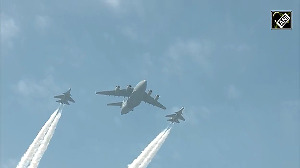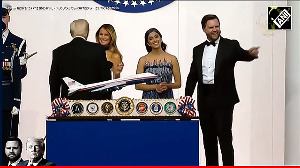China's threat against Taiwan is much more serious than what is visible and any attempt by Beijing to change the status quo by force will have severe consequences for the world including on the supply of semiconductors, Taiwanese Foreign Minister Jaushieh Joseph Wu has said.

In an interaction with an international media group, Wu said that Taiwanese people are firmly determined to protect Taiwan's sovereignty and that their resolve has been further emboldened by the "incredible determination" displayed by the Ukrainians in the face of Russian aggression.
China has been maintaining that Taiwan is a breakaway province that must be reunified with the mainland, and if necessary by force.
China has been regularly sending fighter jets into Taiwan's air defence zone and deploying warships close to the self-governed island.
The Taiwanese foreign minister said the time has come for all democratic countries to find ways to deal with China's expansionist agenda and its military muscle flexing, especially in the maritime domain.
"I am not sure whether the Chinese have been seeing the Ukrainian war the way other countries are seeing it. Russia, with one of the largest militaries in the world, is having difficulties in its invasion of Ukraine," Wu said.
"Many people anticipated that the war would end in a week or two. But it dragged on for more than one year already and that is a good lesson for China," he said.
Wu said the Chinese leadership must understand the "difficulties of launching a war" against Taiwan and that China does not have any guarantee to win.
"If they understand, they should refrain from using military threats against Taiwan..One thing we keep reminding the world that any war, especially in this part of the world, might impact upon the rest of the world," he said.
The Taiwanese foreign minister cautioned that any military hostilities by China against Taiwan will have a serious impact on the global supply chain, especially on semiconductors.
India and countries across the world depend heavily on the semiconductors produced in Taiwan. Wu said Taiwan supplies 90 per cent of the advanced chips required across the globe.
"Any war that China wants to use against Taiwan is going to have a serious global impact because of that. We are glad to see that major international leaders are cautioning China not to change the status quo, especially by force," he said.
"We saw the incredible determination of the Ukrainians in fighting for their sovereignty. I think the people in Taiwan are inspired by the Ukrainians. We are more determined now in fighting for our freedom and sovereignty," he said.
"We also saw the international support for Ukraine and that is something I would describe as critical for Ukrainians to fight for their freedom and sovereignty," he added.
The Taiwanese foreign minister said the war in Ukraine has highlighted the importance of asymmetric warfare.
"The Ukrainians have been very brave in fighting against one the largest militaries in the world. There has been a strategy of asymmetric warfare and that is the kind of lesson we have to learn from the war," he said.
"We are also engaging in military reform in a very serious way. For instance, we are trying to get our military to adapt to the asymmetric type of warfare as well. We are trying to acquire weapons for asymmetric warfare," he said.
Asymmetric warfare refers to unconventional forms of warfare.
Wu said Taiwan is glad to see that major international leaders are cautioning China not to change the status quo, especially by force in the Taiwan Strait.
The Taiwan Strait separates Taiwan from China. The US regularly sends its warships to the region in reflection of its close ties with Taipei.
In the interaction, Wu described the Russian aggression against Ukraine as "unprovoked".
"It is against the most fundamental principles of human rights. There is gross violation of human rights. The war is also a gross violation of fundamental tenets of peaceful resolutions of international disputes," he said.
Wu said Taiwan is also providing humanitarian assistance to the Ukrainians including those inside Ukraine and those taking shelter in countries like Poland, Slovakia and Lithuania.
"The Ukrainians have been very brave in fighting against one the largest militaries in the world," he said.
Around two months back, the Taiwanese foreign minister said that Taipei is preparing for the possibility of a conflict with China in 2027.
India does not have formal diplomatic ties with Taiwan but both sides have trade and people-to-people relations.
Following the eastern Ladakh border row with China, some experts in India have been pushing for upgrading New Delhi's ties with Taipei, especially in the trade and investment sectors.











 © 2025
© 2025